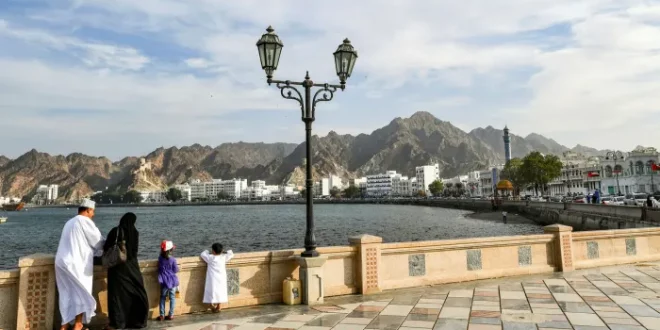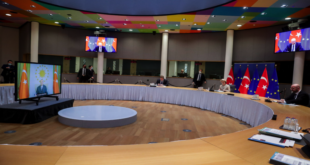Coronavirus and plunging oil prices may force new leader to turn to Gulf neighbours for help
Sandwiched between Saudi Arabia and Iran, Oman has long prized its neutrality, garnering a reputation as the Middle East’s Switzerland.
But the Gulf state’s ability to steer clear of regional power struggles has been put at risk by economic woes that have been exacerbated by the coronavirus pandemic and the slump in oil prices. The IMF forecasts an economic contraction of 10 per cent this year, far steeper than the Middle Eastern average.
The crisis has been a baptism of fire for Sultan Haitham bin Tariq Al Said, who succeeded Qaboos bin Said Al Said in January after the death of the leader who shaped modern Oman during his half century on the throne.
As the 65-year-old former culture minister grapples with a ballooning budget deficit and rising debts, he has to decide whether to turn to wealthier neighbours for a bailout or try to balance the books through other means while maintaining social stability.
If the deteriorating economic situation forces him to take the former option, it threatens to suck Oman into a toxic dispute that pits Saudi Arabia and the United Arab Emirates against Qatar and undermine Muscat’s ability to act as a regional mediator.
“Given the fiscal burden, Oman will have to turn to its Gulf neighbours for direct or indirect fiscal support,” said John Sfakianakis, a scholar at Cambridge university.
“But this presents a dilemma — taking UAE money may jeopardise Oman’s neutrality as it would align Muscat more closely with the Abu Dhabi-Riyadh alliance,” said Mr Sfakianakis. “The same applies for Qatar.”
A close western ally, Oman has long pursued a neutral foreign policy, maintaining good relations with Saudi Arabia’s nemesis Iran, while also helping Qatar sidestep the trade embargo led by the kingdom.
It hosted the secret talks that forged the 2015 Iran nuclear deal and Muscat’s openness towards Tehran, to the chagrin of its Gulf neighbours, has made it a frequent stop in Saudi negotiations with Iran-allied Yemeni rebels. This month, it became the first Gulf state to return an ambassador to Damascus after maintaining diplomatic ties with Syrian regime through the brutal civil war.
UAE-Omani relations have long been fraught — not least because of the discovery of an alleged Emirati spy ring in the royal court a decade ago. Abu Dhabi is keen to pursue a better relationship with the new ruler, who is steering one of the most fragile economies of the oil-rich Gulf states.
The sultanate’s budget deficit is forecast to hit 20 per cent of gross domestic product this year after revenues tumbled. With modest hydrocarbon resources, Oman has around $16bn in foreign exchange reserves and another $16bn in readily available overseas assets, but the fiscal shortfall and maturing global bonds amount to more than $13bn a year for the next three years.
The sultanate, which borrowed $2bn from global banks in August, will need to draw down domestic deposits including from the sovereign wealth fund, asset sales and more loans in order to steady the budget. It is considering a return to bond markets to raise $2bn-$4bn.
“Even before coronavirus and the latest oil price shock, Oman was struggling to balance the books,” said Krisjanis Krustins, director of sovereigns at rating agency Fitch. “But now they are in the position where they have to reduce spending more radically or the money could run out.”
Last year, the wealthier Gulf states provided a $10bn package for Bahrain after it failed to raise more debt on international markets. So far there have been talks about the potential for Emirati investment in Omani projects, rather than any financial deposit, said one western official.
Suspicion of UAE intentions runs deep among many Omanis and the leadership may balk at preconditions of support that might erode Muscat’s prized independence. Bankers also say there have been discreet talks with Qatar over financial assistance, with Doha keen to repay Oman for its logistical support in “beating the blockade”.
China, meanwhile, has expanded operations in Omani ports and bought a $1bn stake in the electricity distribution network last year. In 2017, leading Chinese banks lent Oman $3.5bn. “Given deep economic ties, China might be a good opportunity, but the US would likely have objections,” said Jonathan Fulton, an assistant professor at Zayed University in Abu Dhabi.
Wherever he turns for help, the economic crisis is set to test public support for the new sultan, who has already made his mark with a sweeping revamp of the bureaucracy.
He slashed public spending by 8 per cent in the first half of the year, cutting expenditure on big projects and defence, while sustaining the sultanate’s large public-sector wage bill. The government this week announced plans to introduce a 5 per cent sales tax next year, a revenue-raising gamble but one that risks popular discontent.
A decade ago, protests swept Oman during the Arab spring. Qaboos, the late sultan, subdued the unrest by sacking ministers and bestowing government largesse. This time around, it may prove more difficult. “Haitham is firmly in power and has a lot of goodwill,” said one Omani observer. But said Mr Krustins: “The potential for political or social unrest has to be a factor weighing on Oman’s leadership . . . There is bound to be a bit of self-censorship in what the government is doing on fiscal reform.”
_____________________________________________________
(*) This article was originally published on The Financial Times . Read the original article. The views expressed in this article belong to the author and do not necessarily represent ForMENA
 ForMENA Council for MENA affairs
ForMENA Council for MENA affairs



